
Centipede is a 1981 fixed shooter video game developed and published by Atari for arcades. Designed by Dona Bailey and Ed Logg, it was one of the most commercially successful games from the golden age of arcade video games and one of the first with a significant female player base. The primary objective is to shoot all the segments of a centipede that winds down the playing field. An arcade sequel, Millipede, followed in 1982.
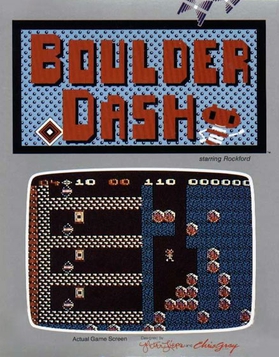
Boulder Dash is a maze-based puzzle video game released in 1984 by First Star Software for Atari 8-bit computers. It was created by Canadian developers Peter Liepa and Chris Gray. The player controls Rockford, who tunnels through dirt to collect diamonds. Boulders and other objects remain fixed until the dirt beneath them is removed, then they fall and become a hazard. Puzzles are designed around collecting diamonds without being crushed and exploiting the interactions between objects. The game's name is a pun on balderdash.

TimeSplitters 2 is a first-person shooter video game, developed by Free Radical Design, published by Eidos Interactive, and released in October 2002 for PlayStation 2, Xbox and GameCube. The game's story focuses on the efforts of a space marine who seeks to recover powerful time crystals from a race of alien mutants called TimeSplitters, which leads them to taking on the form of an individual dealing with their own problems across different time periods between the 19th and 25th century. The developers focused on expanding the story element following 2000's TimeSplitters, and features influences from various film genres, including horror, action and science fiction.

Street Fighter II Turbo: Hyper Fighting is a competitive fighting game released by Capcom for arcades in 1992. It is the third arcade version of Street Fighter II, part of the Street Fighter franchise, following Street Fighter II: Champion Edition, and was initially released as an enhancement kit for that game. Released less than a year after the previous installment, Turbo introduced a faster playing speed and new special moves for certain characters, as well as further refinement to the character balance.

Infinity Blade was an action role-playing game developed by Chair Entertainment and Epic Games and released through the Apple App Store on December 9, 2010. It was the first iOS video game to run on Unreal Engine 3. In the game, the unnamed player character fights a series of one-on-one battles in a derelict castle to face the immortal God King. When in battle, players swipe the screen to attack and parry, and tap the screen to dodge and block enemy attacks. Upon defeat, the player restarts the game as the character's descendant with the same items and experience level.
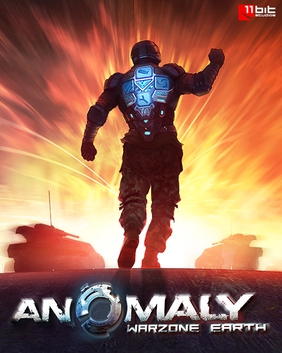
Anomaly: Warzone Earth is a real-time strategy tower defense video game by 11 bit studios. The game was initially announced in late 2010, and released on April 8, 2011 for Windows and Mac OS X.

Kingdom Rush is a 2011 tower defense game developed by Ironhide Game Studio and published by Armor Games. In the game's medieval fantasy setting, players take control of a general serving under King Denas of Linirea, who must defend the land from an onslaught of evil monsters. Each level is composed of a number of pre-set roads, which the player can place defensive towers around to fight off the approaching monsters. Slaying enemies gives the player gold, which they can use to buy new towers or upgrade existing ones to improve their capabilities.
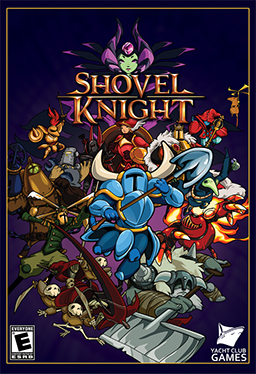
Shovel Knight is a platform video game developed and published by Yacht Club Games. Development was crowdfunded and the game was released for Nintendo 3DS, Wii U, and Windows in June 2014. It was ported to OS X and Linux in September 2014, PlayStation 3, PlayStation 4, PlayStation Vita, and Xbox One in April 2015, Amazon Fire TV in September 2015, and Nintendo Switch in March 2017. Shovel Knight is inspired by gameplay and graphics of platformer games developed for the Nintendo Entertainment System.
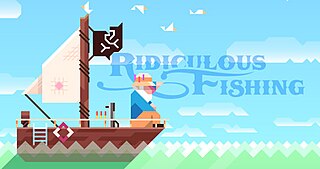
Ridiculous Fishing is a fishing video game developed and published by Vlambeer. In the game, players use motion and touch controls to catch fish and subsequently shoot them out of the sky for cash. The game was released for iOS on March 13, 2013, then later that year for Android.

Simogo is a Swedish independent video game developer based in Malmö. The company was founded in 2010 and is best known for creating games for mobile devices, including Year Walk and Device 6. Its name comes from the name of its founders Simon (SIM), and Gordon (GO); the 'O' from the Swedish word "och" meaning "and".

Monument Valley is a puzzle and indie game by Ustwo Games. The player leads the princess Ida through mazes of optical illusions and impossible objects while manipulating the world around her to reach various platforms. Monument Valley was developed over ten months beginning in early 2013 based on concept drawings by company artist Ken Wong. Its visual style was inspired by Japanese prints, minimalist sculpture, and indie games Windosill, Fez, and Sword & Sworcery, and was compared by critics to M. C. Escher drawings and Echochrome. The art was designed such that each frame would be worthy of public display.
Grumpyface is a mobile game developer based in Phoenix, Arizona, United States. It was founded by Chris Graham in June 2010. They are best known for their collaboration with Adult Swim Games and Cartoon Network Games, and have developed over seven titles between the two publishers. Some of Grumpyface's most popular titles include Castle Doombad, Super Mole Escape, and Steven Universe: Attack the Light!.

Horizon Chase is a racing video game developed and published by Brazilian company Aquiris Game Studio. It was released on August 20, 2015, for iOS and Android platforms. It is a 3D game inspired by 2D, 16-bit titles like Top Gear. Its soundtrack has Nintendocore influences.
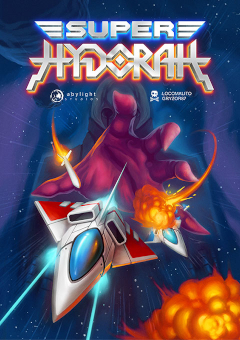
Super Hydorah is a 2017 independent side-scrolling shoot 'em up video game developed by Locomalito and published by Abylight Studios. It features a 16-32 bit era look and feel as well as a CRT Monitor effect. The game was released for Microsoft Windows, Xbox One, PlayStation 4, and PlayStation Vita on September 20, 2017, and later, in 2018, ported to iOS on May 17 and Nintendo Switch on November 15, respectively. The game is an expanded and enhanced version of the developer's previous freeware game Hydorah.

Dicey Dungeons is a roguelike deck-building game developed by Irish game designer Terry Cavanagh. It was released for Microsoft Windows, macOS, and Linux in August 2019, for Nintendo Switch in December 2020, for Xbox One and Xbox Series X/S in November 2021, and for PlayStation 4 and PlayStation 5 in February 2023. Ports for iOS and Android were released in July 2022.

Alto's Odyssey is an endless runner and sandboarding video game developed by Team Alto and published by Snowman (iOS) and Noodlecake Studios (Android). The player controls Alto as he explores the endless desert across different biomes, each with unique traversal mechanics and challenges. Developed over a year and a half, it was released in 2018 for iOS and Android. It is the sequel to Alto's Adventure (2015).
Apple Arcade is a video game subscription service offered by Apple. It is available through a dedicated tab of the App Store on devices running iOS 13, visionOS, tvOS 13, iPadOS 13, and macOS Catalina or later. The service launched on September 19, 2019.
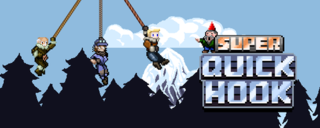
Super QuickHook is a 2010 mobile 2D platform game developed and published by Rocketcat Games. The game released on June 17, 2010, for iOS devices, with an Android port releasing later on July 23, 2015. The game is a spiritual successor to 2009's Hook Champ, and follows its playing characters traversing two-dimensional levels, primarily using a grappling hook.

Leap Day is a 2D level-based platform game developed and published by Nitrome, first released for iOS and Android on May 11, 2016. Players must reach a Gold Cup at top of a procedurally generated level by controlling a character which runs automatically, tapping on the screen to make the character jump in order to collect fruits, dodge enemies and hazards, and progress through the level. A new level is generated every day, with levels from previous days available to play after watching an advertisement.

Does Not Commute is a 2015 puzzle and strategy game developed and published by the Swedish studio Mediocre. In the game, the player has to move vehicles to a certain point on a level while avoiding other vehicles from their previous attempts. It was released for Android and iOS devices on April 23, 2015. Received positively for its gameplay, the game won the 2015 edition of the Apple Design Awards.














